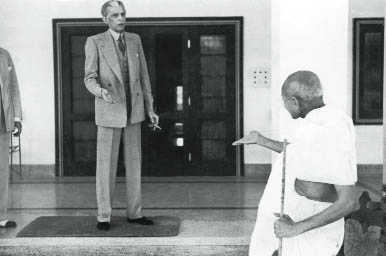
Imagine the scenario if Gandhiji and Jinnah could have come to some understanding.
WHEN I was editing a journal, a friend suggested I consider doing an issue on alternative political scenarios and call it 'What if?' The idea was to invite writers and commentators to consider what could have been the history of India if certain landmark events had worked out differently. He assured me that he had read a very interesting book on such a possibility in the context of world history. For whatever reason, I chose to disregard his advice but now, when stuck in a boring social gathering, I have often used this line to provoke reactions from other guests and it has acted as an instant ice-breaker. Needless to add some wonderful debates have emerged out of such situations. So I am listing out some scenarios for my readers to try on friends and family.
What if Gandhiji had not been assassinated in 1948? Just imagine what momentous changes could have resulted from a longer life for Bapu. If I recall my history correctly, Gandhiji had promised to lead a march to Pakistan and his last fast in Delhi was undertaken to put pressure on the Indian Government to cede a greater sum to Pakistan as a fair distribution of the common sovereign fund. Perhaps if he had gone to Pakistan and managed to persuade Jinnah to give up the demand for a separate country for Muslims, we could have still been one large country and the history of our two nations would have been radically different. It is teasing to think of all the possible outcomes: no knotty Kashmir issue between the two nations could have certainly erased several sore points that have become gangrenous over the sixty years and more of poison and mutual hatred.
Everyone knows how virulently Gandhiji opposed the two-nation theory (and now this view seems more and more sane). In fact, he is said to have declared that Pakistan would be created over his dead body. What if instead of total Swaraj, the subcontinent had opted for an independent dominion status, as did Canada and Australia? We could have been free in every sense but the presence of a Governor-General-like figure (he could be an Indian, such as Rajaji was) would ensure that political decorum was maintained.
This may evoke howls of protest but seriously consider what Delhi would have to suffer if its Lt Governor did not restrain its ebullient and loopy CM from indulging in whimsical, anarchic antics (recall his dharna on the eve of the Republic Day celebrations). Similarly, if Hyderabad had been declared a Union Territory under the watchful gaze of an Administrator, the ugly face-offs between Andhra Pradesh and Telengana could have been avoided and a great deal of money saved.
Do we not have the example of Chandigarh before us? I can guarantee you that a great amount of debate can be extracted from these two 'what ifs' alone!
Let us now look at another possibility: what if Sardar Patel rather than Nehru had become our first Prime Minister? This debate in a sense has already been going on ever since the rise of the BJP. However, before considering this alternative we will have to factor in some other variables. We will have to put aside, for instance, the fact that Patel did not live as long as Nehru and his early demise may have plunged India into the same political turmoil that Jinnah's early death did in Pakistan.
Let us nevertheless pursue this alternative: so, what would have been the future of India if Patel had been made its first Prime Minister? For one, perhaps the Maharaja of Kashmir would have been persuaded to voluntarily join the Union of India and its problematic Act of Accession could then have been quietly buried. Again, under Patel, India may never have opted for a socialist-style centralized planning system and its federal structure would be strengthened as had been envisioned by the makers of the Constitution.
Another possibility is a different interpretation of the secular state, where different faiths could have been persuaded to accept a Common Civil Code. After all, if the Hindu Code Bill was rammed through despite protests from the hardliners in that faith, perhaps the Muslims may have also agreed to accept a Common Civil Code. Time and again, we have backed off from taking on the hardliners in the Muslim community when every liberal Muslim favours equal rights for women. The Sharda Act that bans the marriage of Hindu girls under the age of eighteen could very easily have been applied to Muslim girls as well, as could the Hindu Undivided Family Act. Joint families in every faith have similar problems and drawbacks. So why deny progressive laws to the Muslims of this country?
Above all, the distressing trend of power being concentrated within a family would have never become the monster that has strangled the talent of every political party. Apart from just a few political parties, the tradition of keeping power within the hands of a few trusted family members has, over time, made a mockery of our democratic values.
Finally, what if India had opted for a Presidential form of government rather than a Westminster style parliamentary democracy? These are just a few dream scenarios but they trigger interesting discussions. Do try them out.



























